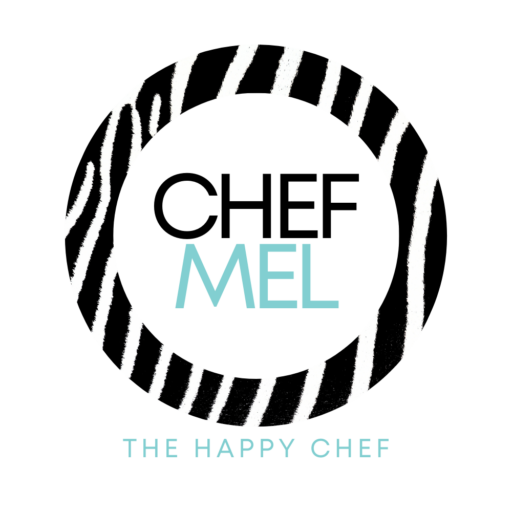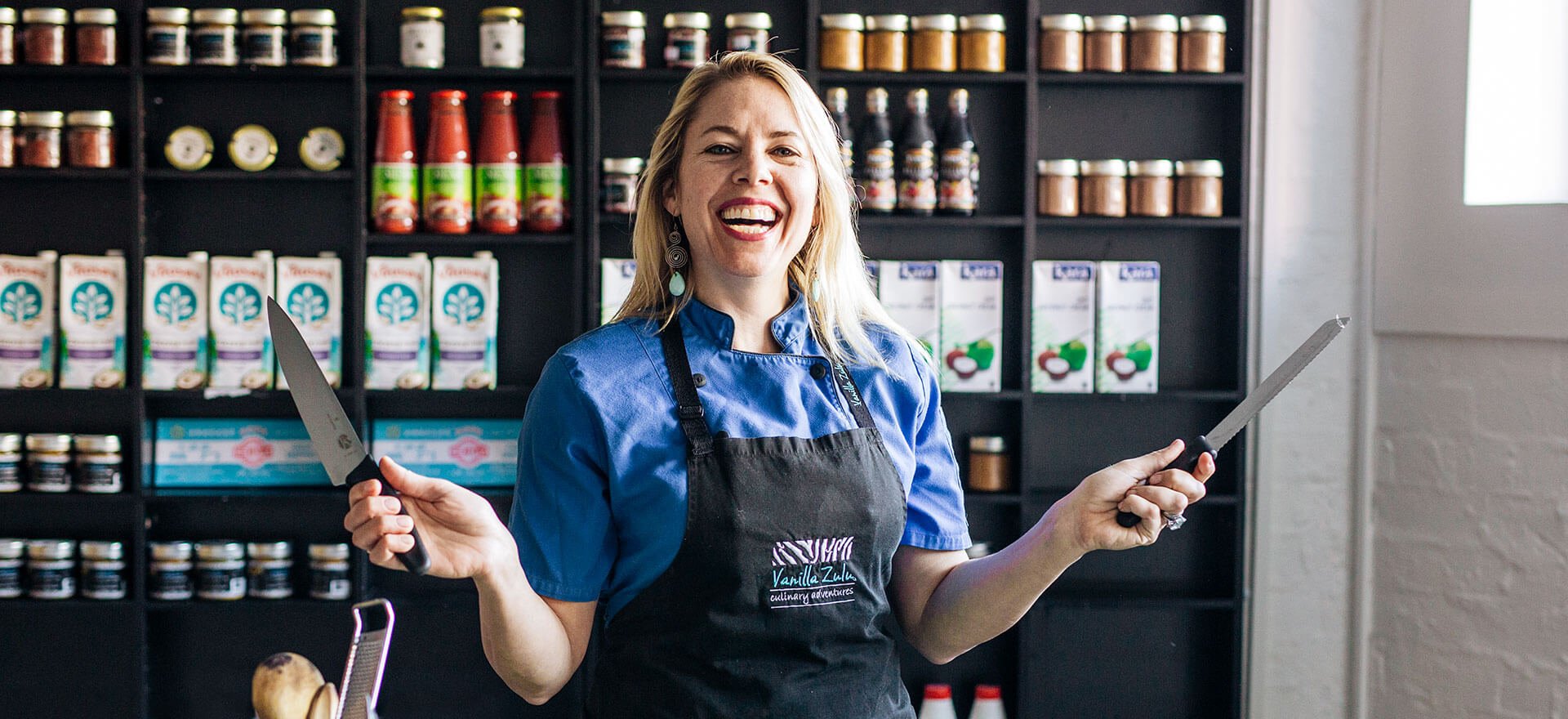It was a wonderful bit of fun to be featured on the Moula website about the rise of my glorious little Vanilla Zulu.
Melanie Townsend grew up on a farm in Zimbabwe where fun meant cooking or baking. Learning how to make a little go a long way instilled an irrepressible creativity in her cooking, a lifelong passion for food, and led her to start two culinary schools on two different continents.
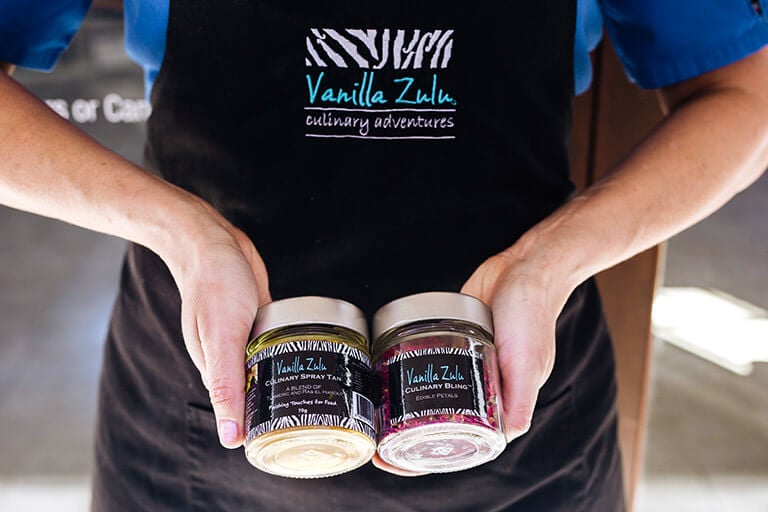
Mel’s passion for food led her from Zimbabwe, around the world, to Brisbane where she started her cooking school and team building business, Vanilla Zulu, in 2011. Mel always knew she’d be a chef, but the unglamorous and anti-social reality of the commercial kitchen spurred her on to create a different career within her passion for food. With no background in business, she leant on the experience she did have and started developing her own business.
“In school, I always knew I would become a chef. So I studied to be a chef and worked as a chef but couldn’t handle the harsh reality of working in a commercial kitchen. I had no business background so I used my experience working in commercial kitchens managing a brigade of staff to guide my way. Growing up being super thrifty helped me keep things lean on the financial side of the business. When you start your own business you have to come up with a plan and make it happen, the only resources are the ones you create for yourself, so making a little go a long way helps a lot. Starting a small business relies on having the guts to take that leap and trust yourself. Being passionate about what you do helps and your customers can see that – Vanilla Zulu’s growth is built on repeat and referred customers.”
You need to back yourself before others will
For a while, Mel was living the dream. She travelled the world as a chef while working for Compass – a large international culinary services company. But the urge to settle down struck and she moved into a management role closer to her home in Durban, South Africa. Over the years she worked her way into more senior positions but being away from the tools – not being able to cook every day – took its toll and inspired her to start her own business.
“I took a management role with Compass and worked my way up to Area Manager. While it was great pay and I had a company car and I was managing a bunch of different units, there was no cooking and I just missed working with food. I walked into my boss’ office and told him I was resigning to start my own cooking school. He looked at me and said he would hold my role for me because nobody wanted to learn how to cook. He said outright that it was a silly idea. He’s still a good friend of mine so I make sure to send him every newspaper article and awards I get.”
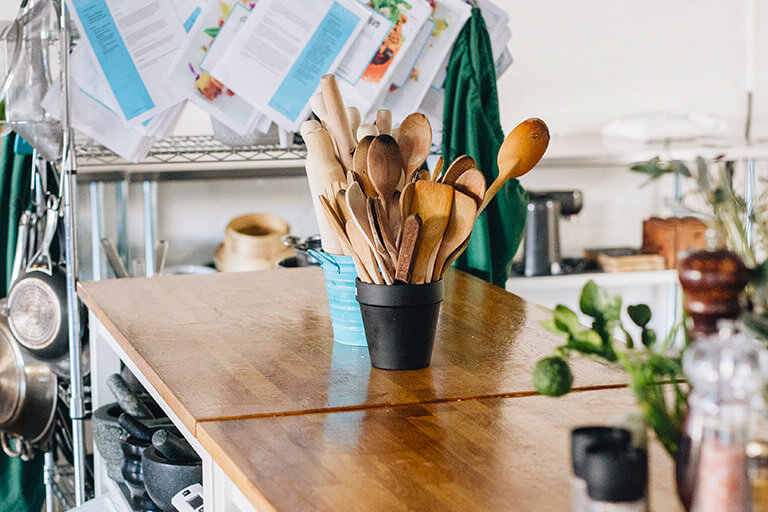
Making cooking cool before it was cool
Fuelled by a desire to create the work life she wanted, and spurred on by her ex boss’ pessimism, she threw herself into her business.
“In 2001, it wasn’t cool to learn how to cook. Cooking didn’t have the cool profile it does today. There were no mainstream cooking shows, no Masterchef or anything. If you weren’t working in a commercial kitchen it was called hobby cooking. The first year was really tough. It was the first culinary school of its kind so I had to educate people about why they should try one of my classes. Once I started having some success with getting people along to classes, the word of mouth referrals were extraordinary.”
A new start halfway around the world
Mel ran the Durban cooking school for eight years before selling up and moving to Brisbane, Australia with ambitions to open another cooking school as soon as possible. She quickly realised Australia was a drastically different playing field and adjusted her plans accordingly. She worked as a product development chef for three years, building up a network of local foodies, chefs and suppliers. And, in her spare time, figured out the idiosyncratic differences between starting a business in South Africa and Australia. When the time came to push play on her business plan, she moved quickly. And although Mel had been planning her business for years and everything was in place, there were still a lot of obstacles, especially financially.
“One day, in my third year as an Aussie chef, I realised it was time to leave and I resigned that same day. April Fools day was my last day and I remember going to a Brisbane Broncos game that night – it was a big day. I had invested heavily in the fit out for my kitchen so I had no money left for marketing, or hiring staff. I was doing everything myself – ordering, planning and running classes, I even did all the dishes by myself for the first three months.”
The vital importance of great staff
After slogging it out on her own for three months, Mel was finally able to bring on a chef’s assistant part time to help with her workload. It was the first step in her growth journey and the first of many new hires.
“Thankfully one of the women who did my class said she’d love to work for me. She worked for me part-time for two years before we got too busy and needed someone full time. She still comes to classes now. Then I hired an assistant and about a year and a half ago I brought on another chef. I trained her up and she’s now running classes so we went from doing four classes a week to nine per week. I now have four chefs working with me and eight chefs assistants. In our peak season, we’re doing up to 11 classes a week. And I’ve just taken our biggest booking, the first in our new venue, for 60 people.”
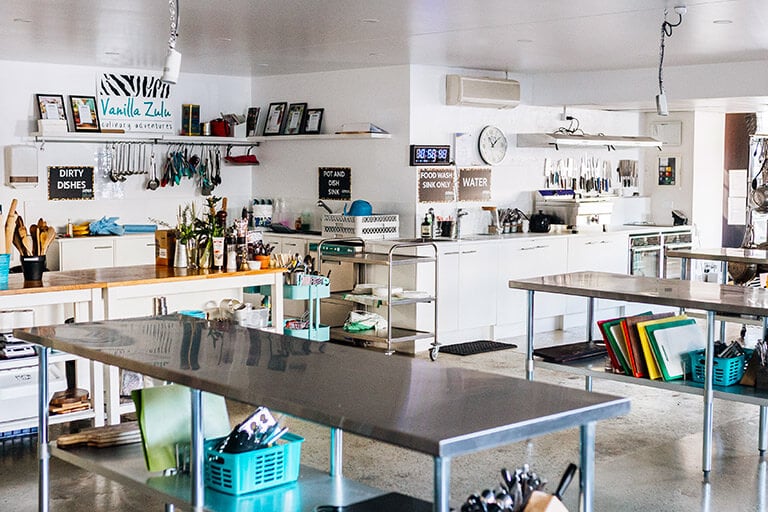
Share your passion and customers will market for you
Mel attributes her success to passion and her growth to her customers, and the two are intricately connected. The passion she and her staff have for cooking make up Vanilla Zulu’s unique offering. Their passion transform the classes from a cooking how-to guide into a memorable and often transformative experience, reigniting people’s passion for cooking. So much so Mel believes the vast majority of her growth can be traced back to customer reviews.
“Our success comes down to sharing our ultimate passion for food. Food is everything for us and sharing that passion takes our classes to another level. I’m constantly thinking about the next recipe, the next menu. We’re all huge foodies, there are no big egos, just passion, skilled experience and professionalism. We tailor our classes to people’s needs, so if people want to learn how to make gnocchi we can do that. We can be responsive because we are a small and adaptable business. It makes for an amazing experience and our customers love it and share it in their reviews.
I’m proud to say that most of my growth is through word of mouth and referrals. We had a school come to us the other month with their staff and the principal told another school principal about the positive effect it had on his staff’s communication. Obviously, we use Adwords and social media to spread word too. That’s just about being visible when people search for cooking classes in Brisbane and front of mind when they’re ready to book into a class or run some team building exercises. But we work really hard to have people leave reviews and share their experiences.”
Clever concept, smart returns
Vanilla Zulu is more than just a cooking masterclass. The business has two revenue streams – private cooking classes and corporate team building. Team building is more than a clever marketing phrase, Mel has leveraged her communications expertise to teach teams better communication through cooking.
“The team building side of Vanilla Zulu popped up quite organically. I did a few events with large groups and noticed that their communication and teamwork improved so I made it a more integral part of the business. Now, businesses are using it instead of other more traditional and less exciting team building experiences. Plus whatever food they make, they get to eat, which is a great reward at the end. I teach people fundamental kitchen skills they can take home and use everyday, everytime they cook. Even having something to talk about that isn’t work is great for work teams.
We’ve had BHP, Suncorp, Bupa, and Rio Tinto come through our kitchen and lots of smaller local businesses too. We custom build menus for our clients. They’re extensive and adaptable, especially for food allergies and specific requirements. We once had a group with 13 different dietary restrictions, including a fruitarian, and we managed to create a great menu for them.”
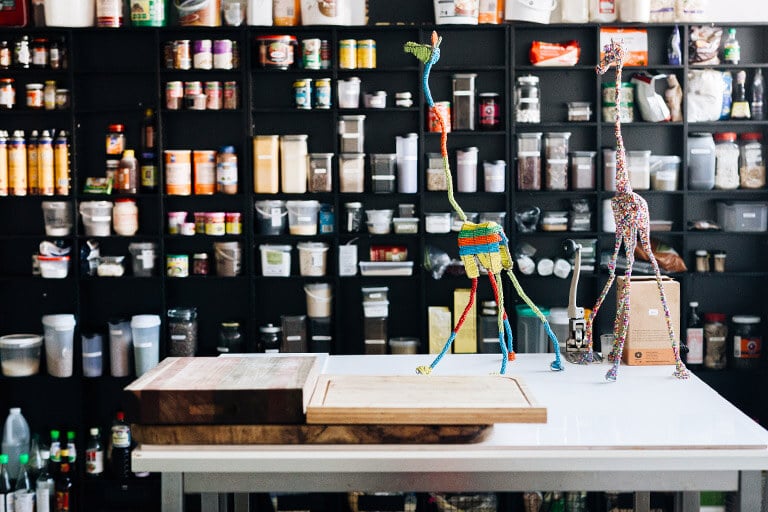
Overcoming cash flow challenges
Unfortunately, small businesses and cash flow issues go together like coffee and mornings. Mel experienced plenty of cash flow challenges but has used the seven years of business data to predict quiet months. However, she continues to battle the rising costs that come with a growing business.
“The problem with any small business is cash flow. Keeping the costs of the business down is an ongoing challenge too. It’s important to be aware of where you can keep costs down without affecting the product. Keeping our menus seasonal helps keep the quality of food up and the cost of food down, because food is becoming more expensive every year. We print menus in-house and being able to turn things around quickly is great for our customers. We’ve worked hard to lay the groundwork and now we can enjoy the benefit of working smarter, easier and leaner.”
Balancing it all
Mel had another motivating factor for growing her business and hiring the right staff – her family. Vanilla Zulu is now at a point where it can operate with a much lighter touch from Mel, which allows her to spend more time with her kids. That doesn’t mean it’s all four hour days and chuckles, rather she uses her flexible schedule to work (sometimes late into the night) once her kids have gone to bed.
“I’m able to work around my gorgeous children – I can pick them up from school and then, once they’ve gone to bed, work to 10pm. It’s great being flexible now the business is at a point where staff can take some of my workload. I have a brilliant financial controller who makes sure there are numbers in the right columns, and my fabulous chefs handle some of the classes so I’m not working every single shift. I now have a PR officer who handles media releases and marketing too. I’ve built a team of passionate staff who are highly capable and help me get the job done efficiently and beautifully. Gone are the days when I did everything on my own. Now I have more time to go to sports days and do all the important things.”
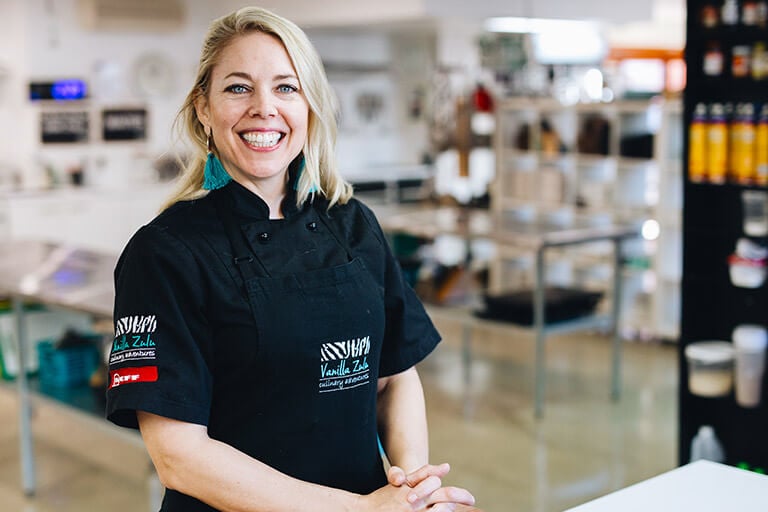
Mel’s top tips for new businesses
When it comes to running a successful business, not knowing what you don’t know can be catastrophic. If you can’t identify the problem, how can you expect to know the answer? Just like founder of Godspeed, and fellow Good Business Spotlight star, Martin Kirby, Mel has made a habit of asking for help as soon as she needs it.
“It’s important to identify your weaknesses and work out solutions for them. Ask for help. You’re human, you can’t possibly know everything. I identified early on that I was terrible at asking for help, so made a concerted effort to ask for help any time I didn’t know what to do, and early on too. There’s no point waiting until the problem has escalated. My life has become infinitely easier since I started asking for help.”
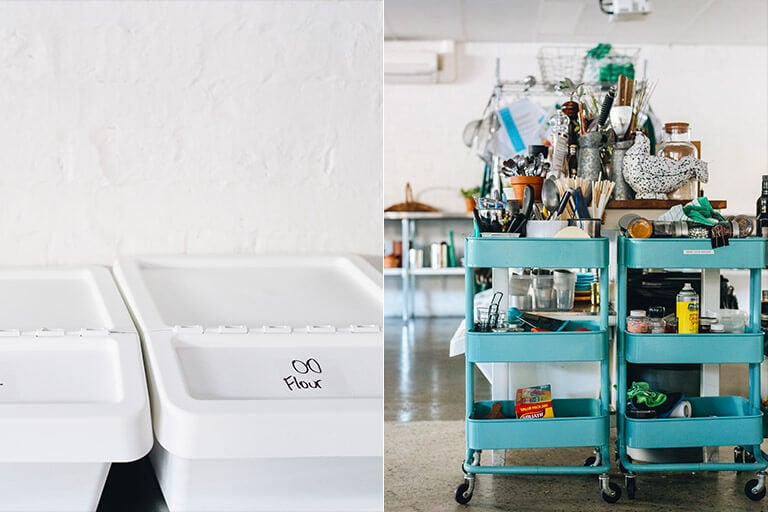
Finding help
“I’ve had some brilliant mentors along the way. Running your own business can be really lonely. You can’t lean over to the desk next to you and use your colleague as a sounding board. You need to pick up the phone or find someone to chat to. It’s amazing to have someone with objectivity and a fresh set of eyes help you work on a challenge. More people should surround themselves with mentors in different industries too. Anyway they can help improve your weaknesses will help you.”
Rapid growth means faster challenges
Vanilla Zulu recently moved to a much larger space that can now take groups up to 100 people. But before this expansion, there was a period of discomfort that demanded patience and understanding from the whole team.
“Our biggest challenge recently has been growing too big for our old space. We had to make it work for some time and, when we finally found the right place for our new shop, there was a glimmer of hope. But we had to be patient while the fit out was finished off, then there was the big move and then the uncertainty of whether we can afford it, is it going to work, is it in the right area – all that self-doubt.”
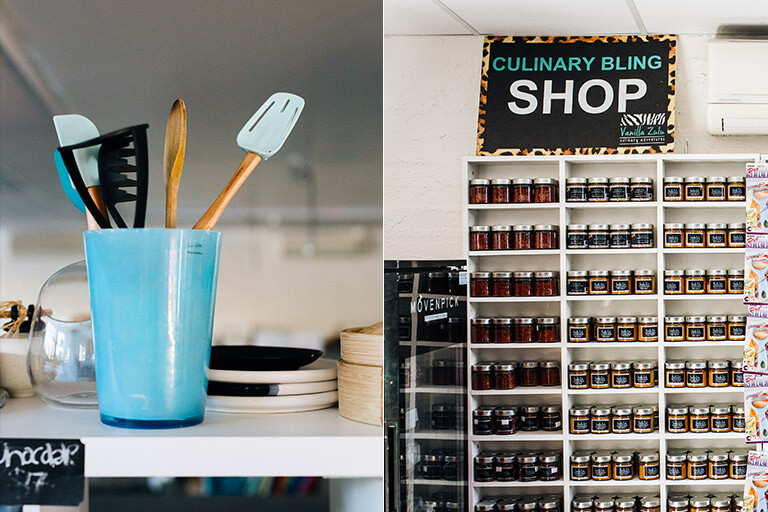
New space, new challenges and turning on the TV
Vanilla Zulu might have a quiet month, but Mel never does. There’s no slow down period while Mel and the team settle into their new space. Mel is launching her own range of products including a collection of spice rubs she’s dubbed ‘culinary spray tans’. A nod to her quirky sense of humour, this special mix of spices (including turmeric) gives your protein a whack of flavour and a lovely orange tan too. She says it’s a way to spice up your favourite dishes. She recently started a 12-week kitchen challenge, to engage with people living outside Brisbane. She’s had brilliant uptake from people all around the world including Germany, South Africa and Italy. As if that’s not enough, she wants to take her offering to the small screen too.
“I’ve been wanting to connect with even more passionate foodies around the globe. If there’s someone in a remote area who wants to learn how to make a croquembouche, I want them to trust me to teach them. We’re creating a series of videos, which will become our in-house TV show, Kitchen Angels. I want that to lead into my own public TV show to share my passion and cooking shortcuts with everyone. I believe I can help people reconnect with that excitement and passion we’ve all felt in the kitchen before.”
